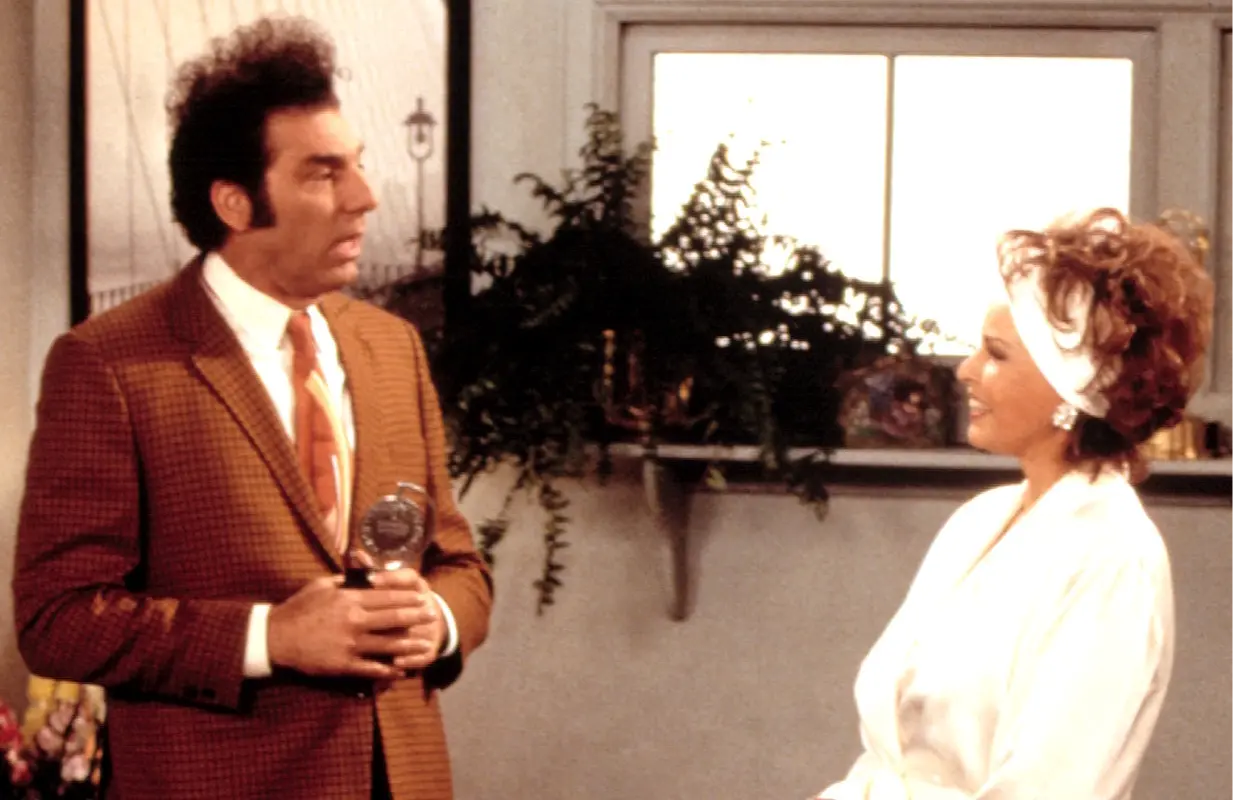Raquel Welch Used TV to Combat Her Pin-Up Persona
-
 Michael Richards and Raquel Welch in Seinfeld (Photo: Everett Collection)
Michael Richards and Raquel Welch in Seinfeld (Photo: Everett Collection)At first glance, it might seem like Raquel Welch's appearance on Seinfeld isn't doing her any favors. In the Season 8 episode "The Summer of George," Kramer (Michael Richards) fires her because of her terrible dancing in a Broadway show, and later, she gets into a fight with Elaine (Julia Louis-Dreyfus) because she thinks Elaine is mocking her stiff-armed approach to choreography. Elaine happens to be talking to a pair of police officers at the time, both of whom respond with salacious excitement about seeing a catfight. Later, when Elaine recounts her story to Kramer and Jerry (Jerry Seinfeld), they also seize on the sexiness of ladies in a tussle.
In other words, the joke seems to be about how men always objectify women, no matter the situation. This is only reinforced by having Welch — who died at age 82 on February 15, after a brief illness — in the scene. For most of her life, she was stalked by the idea that she was a sex symbol, thanks to her mostly wordless performance in 1966's fantasy film One Million Years B.C. More to the point, a poster of her in that film, wearing a fur bikini, made her a generation's go-to pin-up girl. The poster was so ingrained in the nation's imagination that it was featured in movies like The Shawshank Redemption, and Welch herself titled her memoir Beyond the Cleavage to remind people she could do more than hang mutely on a dorm room wall.
And really, her Seinfeld appearance supports her argument. While Jerry, Kramer, and the cops reduce her to a lust object, Welch shows off her comic timing as she fumes about Broadway producers misunderstanding her pizzazz. She also presents herself as a streetwise menace by beating up everyone who crosses her. If the fellas don't see her dimensions, then the joke's on them.
That's not the only time Welch used TV to push back against her pin-up persona. In the '70s, she appeared in several comedy and music specials, which proved she really could sing, dance, and entertain, despite what Kramer might say later. Some of those specials were based on her nightclub act, which she honed over years of live performing, and they featured A-list guest stars like John Wayne and Bob Hope. That roster underscored that she was fully embedded in the entertainment world, as did her frequent appearances on talk shows hosted by the likes of Dick Cavett, David Frost, Dean Martin, Joey Bishop, and Cher. She was one of those all-around, workmanlike performers that were so important to the landscape of '70s variety show television, able to light up a dance number, a comedy bit, or a light-hearted interview.
In the '80s and '90s, like so many of her peers, she crossed over to TV movies. She starred in projects that tackled domestic abuse, the right to die, and alcoholism, and while not all of them were critical successes, they highlighted that Welch had both the appeal and the drive to remain a fixture in American homes. Later, she attained the status of a respected survivor: She appeared in prestige fare like PBS' Emmy-nominated drama American Family and well-regarded sitcoms like Spin City and, of course, Seinfeld. In this phase of her career, she even found a new life in cinema, starring in respected indie films like 2001's Tortilla Soup, which relocated Ang Lee's family drama Eat Drink Man Woman to a Latinx community in Los Angeles. (Welch, whose father was Bolivian, plays the mother of a woman who gets involved with a local chef.)
While it's possible she will always be remembered as the woman in the fur bikini, Welch was an all-around entertainer from the beginning of her career to the end. She just needed television to prove it.Mark Blankenship has been writing about arts and culture for twenty years, with bylines in The New York Times, Variety, Vulture, Fortune, and many others. You can hear him on the pop music podcast Mark and Sarah Talk About Songs.
TOPICS: Raquel Welch, Seinfeld, Jerry Seinfeld, Julia Louis-Dreyfus, Michael Richards